The artisans as GW and Citadel proved to be superior to any other studio at the time. From the late 80's to mid 90's their miniatures were leagues ahead of the competition. Not to take anything away from the rest of the world but the best miniatures were coming from overseas and the best painters from England. Growing up, my brothers and I were into many things including manga and anime, but when we looked at how the Japanese painted their models it seemed like crap compared to the Brits. Even to this day we still agree that Europe produces the best model painters. Yes Japan has some great hobby kits, garage kits and amazing models based on girls, guns and robots... but relatively speaking they can't paint worth a spit. Compare this to the legacy that Citadel created. 25 years later many original sculpts are still in production. Japanese models from that long ago are bought for the sake of nostalgia. Many of the new Citadel models are absolutely amazing but they seem to lack something, a soul perhaps.
A contemporary studio, Ral Partha, created fantastic miniatures for years but didn't put much effort into gaming systems or the community, Ral Partha closed in 2000 but recently reopened with many of the same miniatures and systems, lord knows how long they will stay in business this time. GW had White Dwarf magazine to push the community, they would promote contests at local and even international hobby stores. Fans got a sense that GW believed in the systems as much as the they did. The canon of Warhammer and Warhammer 40,000 are based on the outcomes of games. If the editors wanted to know what should happen to a certain kingdom or planet then they would stage elaborate tournaments to determine it. Fans from around the world would be invited to participate and submit their own battle reports and outcomes from local hobby tournaments. The Eye of Terror is one such worldwide campaign. Writers and artists would then use the outcomes of the games to write novels, create scenarios and update rulebooks. It was the community involvement that made Games Workshop great.
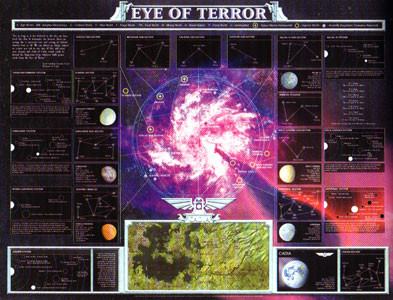
Games Workshop used to crank out gaming systems and venture into new ideas when nobody else would. GW had even tried bringing in casual gamers by partnering up with Milton Bradley to produce simpler versions of their games in the USA. Games like Heroquest and Space Crusade featured Citadel miniatures cast in plastic along with moveable board pieces. The games spawned sequels but were eventually killed. You'd think that Warhammer and 40k are the only systems the company has ever made, but look at this list of rare and out-of print games to see what I lament. Many of these games tied directly into their universe and even influenced future systems. Space Hulk, for example, introduced Terminator Marines and Genestealers (the first wave of Tyranid) into 40k.

In another example, Adeptus Titanicus begat the Epic games of 40k. The scale of the miniatures was changed so that humans were now around 6 millimeters tall. This was done for two reasons, the first so that fans of 40k that couldn't afford an entire squad in 25mm could now buy legions for a fraction of the price. The second reason was to introduce giant robots into the world of 40k. These "Titans" were not flashy and sleek like Japanese robots, like everything else in 40k they were brutish, cruel machine gods that could snuff out the life on planets with their arsenals. The titans would evolve and become crucial to the history of 40k. Although the system has not been discontinued it had been downgraded. The same thing happened to Warmaster, the WH equivalent to Epic.
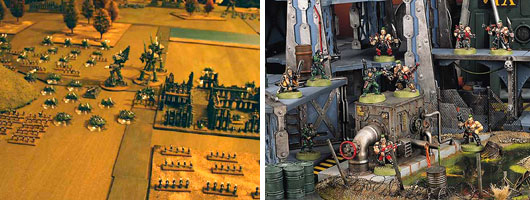
GW killed many titles because they wanted to streamline production, they wanted to focus on the biggest money-makers. The games they discontinued were not bad, many were award winners and fan favorites... just not cash cows. Talisman was one of them, and Man O' War was another. Talisman (now scheduled for a relaunch!) was a fast paced board game that pitted fantasy characters against each other in a quest to recover a magical amulet. Each player had special moves and could pick up additional weapons or magic along the way. My brothers and I enjoyed quick games of Talisman and the few expansions that came out for it. Man O' War was WH miniature combat with ships.
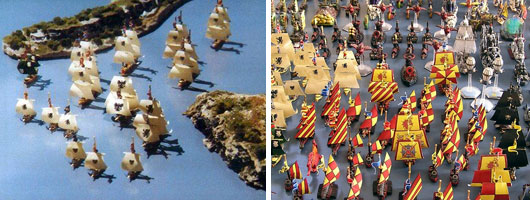
These ships were miniscule, they predate the scale used in Epic and Warmaster. The game was memorable for its ease of use and diversity of ships. All of the Warhammer races were represented and dozens of fantastic models, some with floating islands, submarines or blimps. There were even expansions to this game as well but sadly it was cut as well. The games that GW didn't outright discontinue it put into a shallow grave known better as Specialist Games. While Specialists Games keep a handful of systems alive, GW does not go out of their way to contribute many new things. There is a passionate essay about what it means to the community, I hope you take the time to read it. Perhaps the most famous GW release destined for a Specialist future was Blood Bowl.
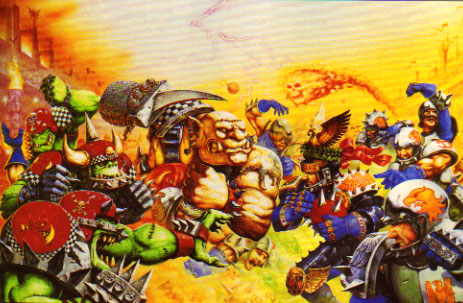
Blood Bowl was fantasy football set in the Warhammer universe. I shouldn't have to tell you, it should be obvious, but there would be no Mutant League Football if not for Blood Bowl. Mutant League was a big hit on the consoles and developed a strong fanbase because of its violent and humorous take on American Football. Players fought, used weapons and magic, bribed refs and killed one another. These things were lifted from Blood Bowl in one way or another. Blood Bowl was way more over the top, characters would hide weapons in the pitch (including chainsaws), blow up rival team dugouts and sneak machines like the Deathroller onto the field. A proper Blood Bowl videogame would absolutely kill, compared to the wannabe Chaos League. At least Cyanide studios got the actual Blood Bowl license last year. Keep your fingers crossed and we might see Blood Bowl on the consoles soon.
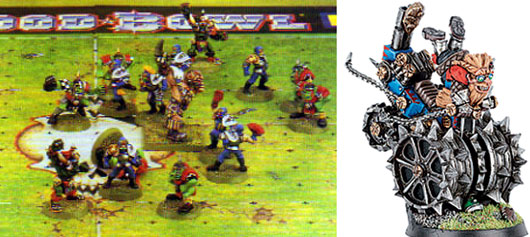
I used to have a blog where I put down my frustrations with the videogame industry, sadly it is five or six blogs over the limit of what I can recover at 1UP. Many of the things I said apply to other industries. The bigger a studio gets, the more likely they are to begin cutting corners. Games Workshop has become like Disney or Capcom. Where the ideas and art once flowed they have now been replaced with business models. Formulaic sequels and tired rehashes have squashed fresh development. This type of micromanagement is good for short-term profits but ultimately hurts the long-term. Greed is good but competition is better. Even when GW was only competing against themselves, the standard was high. Systems had to be nothing short of perfect, especially to warrant the investment of hobbyists. Plus different systems appealed to different gamers. Those that wanted nothing to do with 40k were drawn to the scale of the titans. Those that didn't like WH Fantasy Battle could raise hell in Blood Bowl. It's the new gamers that are important to the survival of the community, the wider the selection the better.
Through shrewd business deals, and many dropped systems, GW has gotten rich, they made enough money on their systems to license the Lord of the Rings and turn it into a tabletop game. The community was not in dire need of a new fantasy tabletop game but GW was eager to cash in on the hype. Should we expect a Harry Potter tabletop game next? Killing perfectly good systems in favor of new licenses makes sense only to those in power, the MBA's. They fail to realize that ideas mold the market, not the other way around. Licensing a hot property is good for the short-term gain. What happens when the license falls out of favor? What other products do they have to offer?
It is sad to compare GW then versus GW now. They have become too shrewd, I dare say cutthroat in business. Overseas retailers used to be treated with respect, now the "mom and pop" hobby stores have to guarantee shelf space and hard pushes on product if they are expected to receive shipment. More than that GW is pushing their retail stores on the community, especially if they want exclusives. My local hobby store is four minutes away, the second major one is 15 minutes away. The nearest GW hobby center is a half hour drive away... not bad considering this is the city, but kids in the outskirts are out of luck. Online retailers can still carry GW product but now they are being asked to remove GW images from their web pages. Who the heck purchases miniatures without seeing what they are getting?
This is where the hubris comes into account. Just because Games Workshop had been on top for so long did not guarantee that they would never fall, that Citadel would have a miniature rival and Warhammer would get serious competition. This goes for their tabletop systems but also for their videogames as well. The lack of quality GW videogame translations is not entirely the fault of the developers. Games Workshop "vigorously" protects their IP. This means that they turn down a lot of offers to make videogames out of their property. They want a lot of directorial input and final approval on many of the licenses. While this helps ensure faithful translations, it also micromanages developers into hell. The majority of videogames based on GW titles have been mediocre at best. Dawn of War, Fire Warrior and Mark of Chaos are the present exceptions. The legend is that Blizzard tried to get the license for Warhammer Fantasy Battle a long time ago but got snubbed. Looking at the licensing requirements they decided to invent their own universes for WarCraft and StarCraft instead. True or not it makes a lot of sense, but the world may never know the truth...
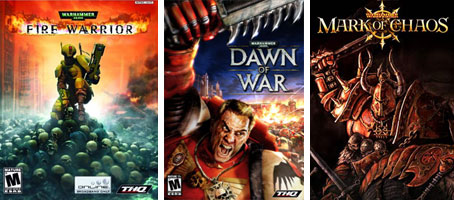
The most damaging thing I've heard about GW has nothing to do with the business. There are rumors that some of the artists and senior members at GW Headquarters are racist. I've met some staffers and long-time artists working for them and can't say there is any truth to that. Still, I have read that some freelance artists have dealt with hard slurs coming from the inside, making working there quite tense, especially for people of multicultural backgrounds. I doubt this is the way the company runs as a whole. This may be a case of a few making the entire company look bad. According to the training manual, this type of discrimination is not tolerated. Hopefully these things turn out to be untrue.
So where does my loyalty go? Do I stick with the company that let many great systems slip through their fingers? Do I turn to the dark side and embrace World of Warcraft? On principle I can not and will not fold. I know people that used to work at Blizzard. Many of the things EA has being accused of had happened at Blizzard as well. That is why I come down so hard on the company and their fans. WarCraft, WoW and StarCraft fans can put a sock in it, be they friend or brother. Like any game system it comes down to community, if GW fans weren't such good people then I would probably have stopped playing a long time ago. There are still people dedicated to the preservation of tabletop gaming, of Blood Bowl and the various classic games. They are the ones bringing in new members with their painting and modeling clinics, with their web pages and blogs. For keeping the game alive and reminding people about the history. This is why I remain, I owe the community.
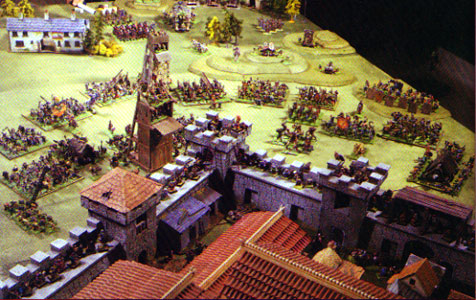
I still owe GW respect, they helped give me a radical childhood. While kids were talking about the X-Men and Power Rangers, my brothers and I were growing up with Dragon Ball and 40k. You'd be hard pressed to find a better mix of violence and science fiction. The art of GW inspires us to this day, without a doubt they continue to inspire the various RPG games as well. I am still a fan of GW, always have been, always will. At the same time I've learned to broaden my horizons and take their business dealings with a grain of salt. Over the past few years have been building tabs on their contemporaries.
Next week I'll begin dropping links to the various tabletop gaming companies and miniature manufacturers. I'll be sure to point out systems in different genres and for different levels of participants (from casual to hardcore) so there should be something for everyone. I will begin with the company that didn't fire a warning shot across the bow of Games Workshop, they fired through the hull! Stick around, the best is yet to come!

No comments:
Post a Comment